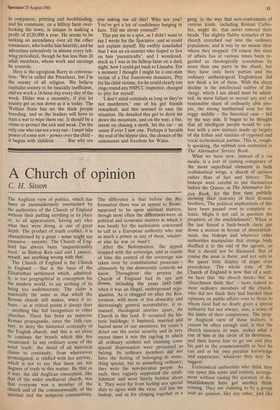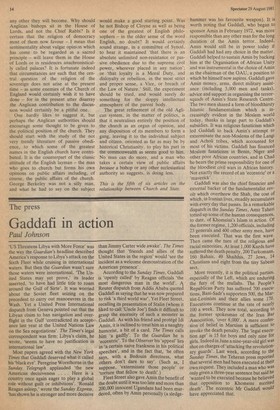A Church of opinion
C. H. Sisson The Anglican view of politics, which has been so inconsiderately overturned by the authorities of the Church of England Without their putting anything in its place or, to all appearances, having any idea What they were doing, is one of great depth. The product of much conflict, it is characterised by a great — some might say excessive — serenity. The Church of England has always been 'unquestionably loyal,' as Bishop Ken said and I cannot, myself, see anything wrong with that.
The Church of England is the Church in England — that is the basis of the Elizabethan settlement which, admittedly, is too geographical in conception for the modern world, to say nothing of its being too undemocratic. The claim is essentially the same as that which the Roman church still makes, when it refuses — as at critical points it always does — anything like full recognition to other Churches . There has been an immense Roman propaganda, since the 16th century, to deny the historical continuity of the English church, and this is no place to continue the brawls which this has occasioned. In any ordinary sense of the word 'truth', the detail of all historical claims to continuity, from wheresover Promulgated, is riddled with lies anyway, Which is not to say that there are not degrees of truth in this matter. Be that as it may, the old Anglican conception, like that of the wider mediaeval church, was that everyone was a member of the Church and of the commonwealth, of the Spiritual and the temporal communities. The difference is that before the Reformation there was an appeal to Rome, supposed to be upon spiritual matters, though most often the differences were on political and economic matters in which it was handy for the ecclesiastic concerned to call in a European authority who was as much a prince as any of them, whatever else he was or wasn't.
After the Reformation, the appeal stopped with the sovereign, and in course of time the control of the sovereign was taken over by constitutional processes ultimately by the democratic controls we know. Throughout this process the Church of England had its ups and downs, including the years 1645-1660 when it was an illegal, underground organisation. As it chugged on after the Restoration, with more or less absurdity and decreasingly general acceptability, it remained, theological niceties apart, the Church in this land. It occupied the historic buildings; it baptised, married and buried most of our ancestors; for years it doled out the social security and in very recent times it was the rag-bag to which all ordinary soldiers not claiming some special dispensation were presumed to belong. Its ordinary members did not have the feeling of belonging to something special, but to something ordinary; they were the non-peculiar people. As such, they vaguely supported the establishment and were faintly bolshie about it. They were far from feeling any special duty to agree with the vicar, still less. the bishop, and as for clinging together in a gang, in the way that non-conformists of various kinds, including Roman Catholics, might do, that never entered their heads. The slightly flabby tentacles of the church stretched out into the ordinary population, and it was by no means clear where they stopped. Of course this state of affairs has at various times been regarded as theologically scandalous by more than one party in the chuch, but they have only been parties and the ordinary untheological Englishman did not think a lot of them. With the sharp decline in the intellectual calibre of the clergy, which I am afraid must be admitted, its mere failure to recruit any sort of reasonable share of ordinarily able people, the strong intellectual case for the soggy middle — the historical case — fell by the way side. It began to be thought that all intelligent people would be content with a new mixture made up largely of the follies and vanities of opposed and vocal ecclesiastical parties. This is, roughly speaking, the rubbish now enshrined in The Alternative Service Book.
What we have now, instead of a via media, is a sort of canting conspiracy of the more superficial elements in both ecclesiastical wings, a church of opinion rather than of fact and history. The bishops were careful to put themselves before the Queen, in The Alternative Service Book, for the first time publicly showing their jealousy of their Roman brothers. The political implications of this have been passed over in complete silence. Might it not call in question the propriety of the establishment? When at the last Synod a back-bench cleric put down a motion in favour of disestablishment, the bishops and whatever other authorities manipulate that strange body shuffled it to the end of the agenda, so that it should not be discussed. But of course the issue is there, and not only in the queer little display of pique over precedence. The whole tone of the Church of England is now that of a sect; we hear that 'the church thinks this' or 'churchmen think that' — news indeed to most ordinary members of the church, who did not think they had handed their opinions on public affairs over to those to whom God had no doubt given a special authority but not always, alas, a sense of the limits of their competence. The proper Anglican view of these matters, it cannot be often enough said, is that the church instructs its man, makes what it can of him in the circle of its devotions, and then leaves him to go out and play his part in the commonwealth as best he can and as his own peculiar knowledge and experience, whatever they may be, suggest.
Ecclesistical authorities who think they can upset this sober and realistic arrangement without raising the question of disestablishment have got another think coming. They are claiming to be a group with an opinion, like any other, and like any other they will become. Why should Anglican bishops sit in the House of Lords, and not the Chief Rabbi? Is it certain that the religion of democracy most of them now favour — I mean that sentimentality about vulgar opinion which has come to be regarded as a sacred principle — will leave them in the House of Lords or in residences anachronistically called palaces? It is fortunate indeed that circumstances are such that the central question of the religion of the sovereign does not arise at the present time — as some enemies of the Church of England would certainly wish it to have done — for in the present utter disarray the Anglican contribution to the discussion would certainly be a pitiful one.
One hardly likes to suggest it, but perhaps the Anglican authorities should encourage some thought to be given to the political position of the church. They should start with the study of the not very trendy literature of passive obedience, to which some of the greatest names in the English church have contributed. It is the counterpart of the classic attitude of the English layman — the man who goes to church but forms his own opinions on public affairs including, of course, the public affairs of the church. George Berkeley was not a silly man, and what he had to say on the subject would make a good starting point. Was he not Bishop of Cloyne as well as being one of the greatest of English philosophers — in the older sense of the word English, no doubt? It would certainly sound strange, in a committee of Synod, to hear it maintained 'that there is an absolute unlimited non-resistance or passive obedience due to the supreme civil power, wherever placed in any nation'; or 'that loyalty is a Moral Duty, and disloyalty or rebellion, in the most strict and proper sense, a Vice, or breach of the Law of Nature.' Still, the experiment should be tried, and would surely do something for the sloppy intellectual atmosphere of the parent body.
The great refinement of the old Aglican system, in the matter of politics, is that it neutralises entirely the position of the church as an organ of opinion, and any disposition of its members to form a gang, leaving it to the individual subject and citizen, oriented as far as may be by historical Christianity, to play his part in the commonwealth as seems good to him. No man can do more, and a man who takes a certain view of public affairs because a bishop or any other ecclesiastical authority so suggests, is doing less.
This is the fifth of six articles on the relationship between Church and State.



































 Previous page
Previous page